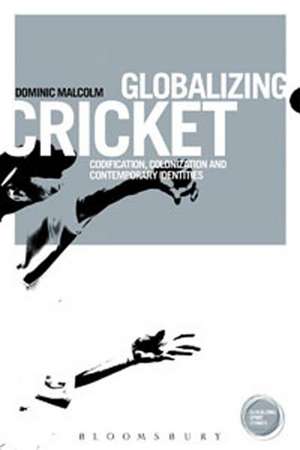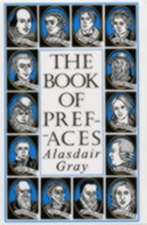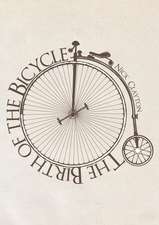Globalizing Cricket: Englishness, Empire and Identity: Globalizing Sport Studies
Autor Dr. Dominic Malcolmen Limba Engleză Hardback – 5 dec 2012
| Toate formatele și edițiile | Preț | Express |
|---|---|---|
| Paperback (1) | 256.20 lei 6-8 săpt. | |
| Bloomsbury Publishing – 4 iun 2014 | 256.20 lei 6-8 săpt. | |
| Hardback (1) | 655.67 lei 6-8 săpt. | |
| Bloomsbury Publishing – 5 dec 2012 | 655.67 lei 6-8 săpt. |
Preț: 655.67 lei
Preț vechi: 762.41 lei
-14% Nou
Puncte Express: 984
Preț estimativ în valută:
125.46€ • 136.71$ • 105.72£
125.46€ • 136.71$ • 105.72£
Carte tipărită la comandă
Livrare economică 23 aprilie-07 mai
Preluare comenzi: 021 569.72.76
Specificații
ISBN-13: 9781849665278
ISBN-10: 1849665273
Pagini: 208
Dimensiuni: 156 x 234 x 23 mm
Greutate: 0.45 kg
Ediția:New.
Editura: Bloomsbury Publishing
Colecția Bloomsbury Academic
Seria Globalizing Sport Studies
Locul publicării:London, United Kingdom
ISBN-10: 1849665273
Pagini: 208
Dimensiuni: 156 x 234 x 23 mm
Greutate: 0.45 kg
Ediția:New.
Editura: Bloomsbury Publishing
Colecția Bloomsbury Academic
Seria Globalizing Sport Studies
Locul publicării:London, United Kingdom
Caracteristici
High number of universities in the UK and internationally that offer courses on sport science, sport studies and the sociology of sport
Notă biografică
Dominic Malcolm is Senior Lecturer in the Sociology of Sport at Loughborough University. He is co-editor of The Changing Face of Cricket: From Imperial to Global Game, and The Social Organization of Sports Medicine, and author of Sport and Sociology and The Sage Dictionary of Sports Studies.
Cuprins
Introduction: Globalizing CricketChapter 1. The Emergence of CricketChapter 2. The 'National Game': Cricket in Nineteenth Century England Chapter 3. The Imperial Game: Cricket and Colonization Chapter 4. Cricket in America Chapter 5. Cricket in the Caribbean Chapter 6. Cricket and the Celtic NationsChapter 7. Cricket and Diasporic Identities in Post-Imperial Britain Chapter 8. Cricket and Changing Conceptions of EnglishnessChapter 9. Cricket, the English and the Process of 'Othering'ConclusionReferences
Recenzii
[A]n example of 'good' sociology and the application of sociology to understanding the development of a sport through exploring social process and interdependencies between groups. For this reason I strongly recommend the text, and consider that it will be of interest to sport scholars, sociologists, historians and cricket fans alike.
In this work of historical sociology based on a wide reading in the secondary literature, Malcom uses the figurational sociology of Norbert Elias to explore the interdependence between broad societal change and individual behaviour...The book raises many other questions...But that one can raise such questions is testimony to the stimulating and significant arguments of this ambitious study and the sense that Malcolm's particular form of sociological analysis can provide answers.
Dominic Malcolm's Globalizing Cricket places the spread of this most imperial of sports firmly within the context of English-ness and empire to produce an absolutely fascinating read.
Sport is currently the hottest topic in Global Studies and this ambitious book, combining an historical sociology of cricket with a sophisticated understanding of the global trends shaping the game, is set to become the leader in its field. It captures the changing nature of cricket, dealing with both global developments and the impact of these developments on the game in England.
The most riveting section focuses on internal colonisation recognising the need to go beyond socially constructed national borders, the advent of multiculturalism in Britain and how this impacts on new conceptions of Englishness and "othering"...To understand any sport it is essential to seek to comprehend how, if at all, the game is central to the fabric of the society in which it is played. Even though cricket is now undergoing the process of "Indianisation", with the game being driven by the global spread of consumer culture as a consequence of the power of international capitalism, the relevance of Malcolm's historical and sociological approach is immense, as it journeys through the colonial and post-colonial eras, whilst always returning to its origins and how the game continues to appeal to its domestic audience. In filling a clear gap in the market Malcolm succeeds in his objectives. The outcome is a volume that will be very useful for the graduate student but also for the sports enthusiast keen to place his/her favoured pastime and the mass of data generated into a critical context.
In this work of historical sociology based on a wide reading in the secondary literature, Malcom uses the figurational sociology of Norbert Elias to explore the interdependence between broad societal change and individual behaviour...The book raises many other questions...But that one can raise such questions is testimony to the stimulating and significant arguments of this ambitious study and the sense that Malcolm's particular form of sociological analysis can provide answers.
Dominic Malcolm's Globalizing Cricket places the spread of this most imperial of sports firmly within the context of English-ness and empire to produce an absolutely fascinating read.
Sport is currently the hottest topic in Global Studies and this ambitious book, combining an historical sociology of cricket with a sophisticated understanding of the global trends shaping the game, is set to become the leader in its field. It captures the changing nature of cricket, dealing with both global developments and the impact of these developments on the game in England.
The most riveting section focuses on internal colonisation recognising the need to go beyond socially constructed national borders, the advent of multiculturalism in Britain and how this impacts on new conceptions of Englishness and "othering"...To understand any sport it is essential to seek to comprehend how, if at all, the game is central to the fabric of the society in which it is played. Even though cricket is now undergoing the process of "Indianisation", with the game being driven by the global spread of consumer culture as a consequence of the power of international capitalism, the relevance of Malcolm's historical and sociological approach is immense, as it journeys through the colonial and post-colonial eras, whilst always returning to its origins and how the game continues to appeal to its domestic audience. In filling a clear gap in the market Malcolm succeeds in his objectives. The outcome is a volume that will be very useful for the graduate student but also for the sports enthusiast keen to place his/her favoured pastime and the mass of data generated into a critical context.
Descriere
Globalizing Cricket examines the global role of the sport's key points of development, the diffusion of cricket through colonization, and its impact on the changing notions of English national identity.





























